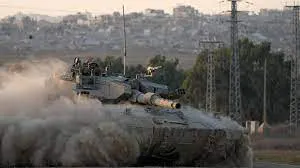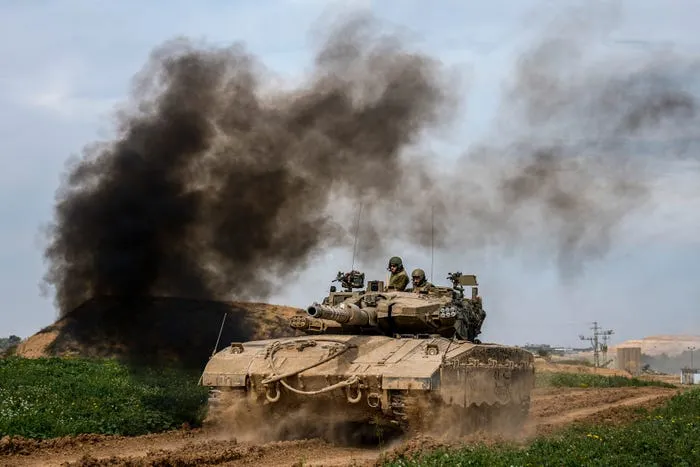
Israel Confirms Death of Hamas Military Chief in July Strike

The Israeli military announced on Thursday that it has confirmed the death of Mohammed Deif, the head of Hamas’ military wing, following an airstrike in Gaza in July. This news comes shortly after another high-profile attack in Tehran killed Hamas’ top political leader, Ismail Haniyeh.
The swift developments have left U.S., Egyptian, and Qatari mediators scrambling to salvage cease-fire talks in Gaza, while international diplomats are working to prevent a full-scale regional conflict. Israel also recently killed a top Hezbollah commander in Beirut, adding to the escalating tensions.
Hamas has not yet commented on Deif’s death, though a member of its political bureau, Izzat al-Risheq, stated that any confirmation would come from the Qassam Brigades, Hamas’ military wing, which has remained silent on the matter.
The elimination of both Haniyeh and Deif marks a significant victory for Israeli Prime Minister Benjamin Netanyahu. After meeting with military officials, Netanyahu stated that Deif’s death “enforces a simple principle that we have established, that whoever hurts us, we hurt them.” He emphasized that Israel would exact a heavy price for any aggression against it.
The assassinations put Netanyahu at a crucial juncture. They could provide a political opportunity to end the war while demonstrating to Israelis that Hamas’ military capabilities have been significantly weakened. Alternatively, the killings could lead to a hardened stance in cease-fire talks, with Israel pushing for more concessions from Hamas, which might respond by digging in or abandoning the talks altogether.
Deif and Yahya Sinwar, the top Hamas leader in Gaza, are believed to have masterminded the Oct. 7 attack that killed approximately 1,200 people in southern Israel, sparking the current conflict. While Sinwar remains in hiding, Israel targeted Deif in a July 13 strike near Khan Younis. The attack also killed another Hamas commander, Rafa Salama, and more than 90 others, including civilians.
The confirmation of Deif’s death came through an intelligence assessment, according to the Israeli military. On Thursday, Israeli airstrikes in Gaza City killed at least 15 people and injured over 40 others at a school sheltering displaced Palestinians. The Israeli army alleged that Hamas fighters were using the school to plan attacks.
Witnesses described the devastation, with Khaled Sukar, 23, recounting the chaos and loss, including the death of his cousin. “Now I’m back to fearing the next time this will happen,” he said. “Please, God, just make it stop.”
Since the beginning of Israel’s 10-month campaign in Gaza, over 39,480 Palestinians have been killed and more than 91,100 wounded, according to Gaza’s Health Ministry. Over 80% of Gaza’s 2.3 million residents have been displaced from their homes.
The war reached its 300th day on Thursday, a grim milestone for the Palestinians living in tent camps with limited resources. “Enough destruction. We are exhausted,” said Ahmad Othman, a displaced resident from Rafah.
In Tel Aviv, families of Israeli hostages still held in Gaza protested outside the military headquarters, urging Netanyahu to secure their release. “Three hundred days is a lot of time,” said Sharon Kalderon, whose brother-in-law is among the hostages. “We just hope that it will end soon because we are tired.”

Netanyahu has vowed to continue the war until Hamas is destroyed. Far-right coalition partners, crucial for his hold on power, have threatened to leave the government if he stops the conflict. Following the announcement of Deif’s death, Finance Minister Bezalel Smotrich said that the “defeat of Hamas is closer than ever” and that the military would continue its efforts to restore security and free the hostages.
Defense Minister Yoav Gallant described the strike that killed Deif as a “significant milestone” in the war. “The results of this operation reflect that Hamas is an organization in disintegration,” he wrote on social media.
Deif, a founding member of Hamas’ military wing in the 1990s, led the Qassam Brigades through numerous attacks on Israeli civilians and multiple Israeli assaults on Gaza. Known for his secrecy, he rarely appeared in public and survived several assassination attempts.
Haniyeh’s death disrupted months of cease-fire negotiations. Egyptian and Qatari officials expressed frustration over the assassination, which they called “reckless.” Qatar’s prime minister questioned the feasibility of mediation under such circumstances, while U.S. Secretary of State Antony Blinken stated that the U.S. had no prior knowledge of the Tehran strike.
As mediators work to name Haniyeh’s successor, the priority remains preventing a full-scale war. The recent killings of high-ranking leaders like Haniyeh and Hezbollah commander Fouad Shukur could lead to further reprisals and escalate the conflict.
In Beirut, hundreds mourned Shukur, with Hezbollah leader Hassan Nasrallah vowing a “well-studied retaliation” against Israel. As the situation remains volatile, the focus is on preventing further escalation and finding a path to peace.



